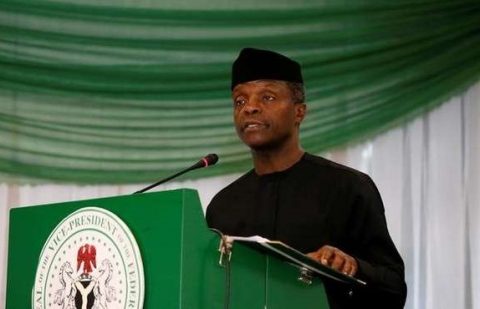Climate Change: Stop Defunding Fossil Fuels Projects In Developing Countries – Osinbajo
Latest Headlines, News Across Nigeria Thursday, December 30th, 2021
(AFRICAN EXAMINER) – Nigeria’s Vice President, Prof. Yemi Osinbajo urged multilateral agencies, and Western countries to stop the planned defunding of fossil fuels/gas projects in developing countries as part of the energy transition plan towards the global net-zero target by 2050.
Prof Osinbajo who has been advocating for a just transition to global net-zero emissions, also harped on the funding challenges for developing countries in its response to climate change and preparation for adaptation, alongside other implications of the Paris Agreement.
As part of that agreement, $100 billion per year was pledged by the wealthier economies to help developing economies to respond to the challenges of climate change and support mitigation and adaptation
He gave the charge recently when he received a delegation from the World Bank at the Presidential Villa in Abuja, Nigeria’s federal capital city.
The delegation was led by its Managing Director of Development Policy and Partnerships, Dr Mari Pangestu, as well as its Country Director for Nigeria, Shubham Chaudhuri.
In a statement by his spokesman, Laolu Akande, the vice president also interacted with officials of the International Monetary Fund (IMF) on its Article IV bilateral consultations during a virtual meeting held on the same day.
The IMF Article IV Consultation Mission team was led by Ms Jesmin Rahman, Mission Chief for Nigeria at IMF. The consultations based on the IMF’s Articles of Agreement involve bilateral discussions between a member country and the IMF.
At both meetings with the World Bank managing director and IMF officials, Prof. Osinbajo said Nigeria remained committed to helping in reducing global greenhouse emissions, even as the needs of Nigeria and other developing countries should also be taken into account.
“I think it is very important, at least this is what we are trying to do, to keep our sights on what would work for the majority of our people. The truth, of course, is that we have fossil fuel resources, we have all of that, but we have energy issues, distribution and quality of access to energy, as well as clean energy.
“So, those are the issues; access to energy and education, then renewable energy, and how to be able to move quickly enough in terms of putting renewable energy in place”, he said.
The VP further reaffirmed Nigeria’s position on climate change. He however pointed out no developed economy grew its industrial base on renewable energy alone and so developing economies should not be asked to do that.
In her remarks, Dr. Pangestu commended Nigeria’s energy reforms, adding that the World Bank would explore ways to ensure developing countries attracted the needed financing so as to achieve its climate and development objectives
She also expressed her delight to visit Nigeria, saying it was her first country mission since assuming her current position in March.
Following COP26, according to her, the global body was considering ways to address both development and the climate crisis in developing countries, adding that the development crisis had been heightened by the COVID-19 pandemic.
“The way we are trying to approach it is the Green, Resilient, and Inclusive recovery and growth strategy which must start with developing countries”, she further explained.
In a related development, the Federal Government has expressed its commitment to finding lasting solutions to the restoration and sustenance of the nation’s ecosystem.
Minister of State for Environment, Chief Sharon Ikeazor who gave the assurance while speaking at the 15th National Council on Environment in Abuja, said the nation is determined to ensure that the present environment is preserved for sustainable development.
“The commitment to finding lasting solutions to the restoration and sustenance of our ecosystem is being assiduously executed through the mandate of the Great Green Wall, waste management, watershed management, renewable energy, eco-tourism, Green bond, aforestation/reforestation programmes, implementation of UNEP report on the Hydrocarbon Pollution Remediation project (HYPREP) and Environmental Impact Assessment (EIA) with the aim of predominantly preserving the environment for sustainable development”, she added.
Related Posts
Short URL: https://www.africanexaminer.com/?p=72354






















